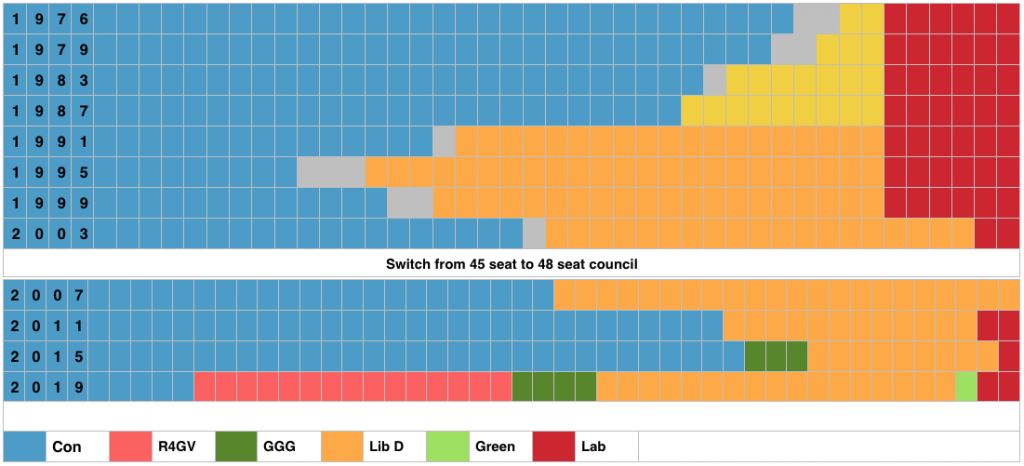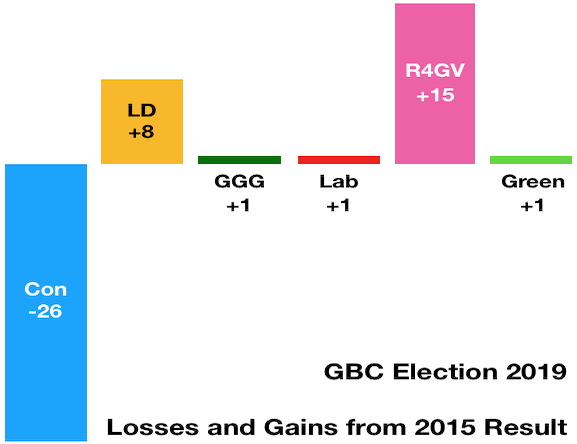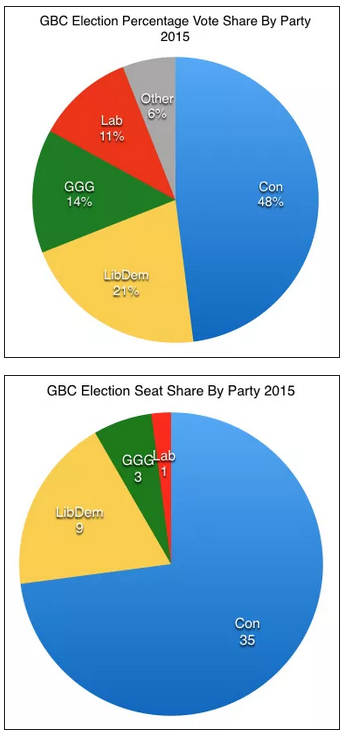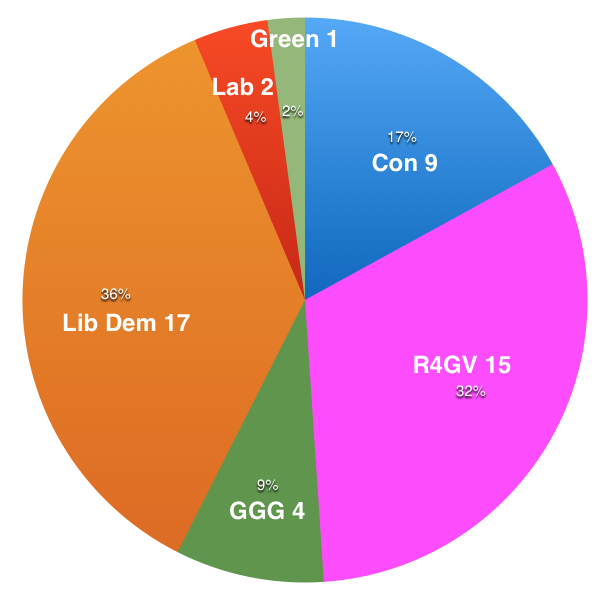 Abraham Lincoln
If given the truth, the people can be depended upon to meet any national crisis...
Abraham Lincoln
If given the truth, the people can be depended upon to meet any national crisis...
 Guildford news...
for Guildford people, brought to you by Guildford reporters - Guildford's own news service
Guildford news...
for Guildford people, brought to you by Guildford reporters - Guildford's own news service
Comment: Analysing the Most Dramatic Local Election in Living Memory
Published on: 4 May, 2019
Updated on: 8 May, 2019

The GBC election count underway.
We know what happened but how? What helped cause yesterday’s groundbreaking election result?
The degree of political change can be seen in the final line of the bar graph below. It is totally different to anything seen since the amalgamation of Guildford Municipal and Rural District Councils in 1974 that formed Guildford Borough Council. Since then it has been predominantly Conservative.

Now, for the first time, we have a major block of independent parties. Power is not concentrated so some parties will be forced to co-operate so the new council can arrive at decisions.

The political makeup of GBC since the 1975 election.
The Liberal Democrats had a good decade in the 1990s but even then they had overall control for only a brief period before defections left them without a majority. With the turn of the century, the Tories regained control culminating in a victory in 2015 where they won 35 of the 48 seats ovewhelming in terms of seats but based on less than 50% of the popular vote.

The GBC election coincided with a general election in which the Tories enjoyed a surge of support and the Lib Dems suffered for their willingness to enter a coalition with the Conservatives.

How it looked in 2015
They seemed unconcerned they had won victory by campaigning under slogans such as “Conservatives Say Greenbelt to Stay”. Such promises could not be kept with the Local Plan they already had in mind.
All large majorities create their own problems. Without real threats from others, parties turn in on themselves and there was some of this. The small leadership team within the Tory group could more or less do what it liked without having to properly win arguments. As Julius Caesar discovered, if you make too many enemies eventually the knives will come out.
The embryo of the R4GV party was the Independent Alliance made up of councillors who had dared to disagree with their leaders, joined by others who had their own axes to grind.
Patronage was part of the control system. If you wanted to get on as a councillor approval from the leader was required. Public opinion didn’t seem to count for much. Many felt the public consultations on the Local Plan were tick-box exercises largely ignored.

GBC Election 2019 – number and percentage share of the seats.
But many Tories could see the way the wind was blowing long before election day on Thursday. They knew from the responses on the doorstep that told them they were in deep trouble
If they weren’t unfairly carrying the can for the Brexit debacle they were being blamed very fairly for collaborating with their national party colleagues and developing a deeply unpopular Local Plan. Many voters simply did not want the scale of development on green belt land that the Plan included.
And then the first-past-the-post system, normally the friend of the big parties, worked against them. They were the only party to field a candidate for every seat and, as a result, secured as big a chunk (26,011) of the popular vote as the Lib Dems (26,096) and higher than the new Residents for Guildford and Villages (20,149).

GBC Election 2019 – percentage share of the popular vote.
But the vote was spread thinly and the careful selection of the Lib Dems and R4GV of the wards in which they would do battle paid off. As well as the obvious pact between the GGG and R4GV parties, the Lib Dems, by accident or adroit design, avoided splitting the anti-Tory vote. This was the key.
For instance, no Lib Dems stood in Clandon and Horsley, Lovelace, Pilgrims, or Send and only one in some other key wards for the independent parties such as Christchurch and Worplesdon.
But even in some seats where all parties competed, such as Holy Trinity, the R4GVs came out on top. They must still be wondering how many more seats they might have won if they could have mustered more candidates. Only in Friary & St Nicolas and Onslow were their candidates defeated in both cases by the Lib Dems.
Of course, whatever the reasons behind yesterday’s result we are, as they say, where we are, and the big question now is where does the council go from here?
How will the power be shared? Will we see coalitions or even amalgamations? Who will be the leader? And what policies will they be able to agree on and deliver, especially within whatever proves to be the constraints of the Local Plan?
Responses to Comment: Analysing the Most Dramatic Local Election in Living Memory
Leave a Comment Cancel reply
Please see our comments policy. All comments are moderated and may take time to appear. Full names, or at least initial and surname, must be given.
Click on cartoon for Dragon story: Public Asked for Views on SCC’s Proposal for Reduced Speed Limits


Recent Articles
- Letter: Will GBC’s New Planning Document on Building Heights Be Effective?
- Proposed New Leisure Contract Should Improve Facilities and the Council’s Income
- Witness Appeal Following Fatal Collision
- Celebration at Guildford Cathedral of its Latest and Future Church Leaders
- Photo Feature: Now You See It…
- Letter: Snail-paced Progress for Full Weir Repair
- Mayor’s Diary: July 5 -July 20
- One Homeowner Recompensed but Fight Continues Over Waverley CIL Charges
- Letter: Fine Those Guilty of Anti Social Behaviour
- GBC Working Hard To Mitigate Looming Weyside Urban Village Deficit


Recent Comments
- Jan Messinger on Public Asked for Views on SCC’s Proposal for Reduced Speed Limits
- Fiona White on GBC Asks Residents for Views on Its Draft Building Height Guidance
- Dave Middleton on Letter: Fine Those Guilty of Anti Social Behaviour
- Carina Coverly on GBC Asks Residents for Views on Its Draft Building Height Guidance
- M Durant on Online Event Will ‘Help Residents Have Their Say On Local Government Reorganisation’
- Jim Allen on GBC Working Hard To Mitigate Looming Weyside Urban Village Deficit
Search in Site
Media Gallery
Dragon Interview: Local Artist Leaves Her Mark At One of England’s Most Historic Buildings
January 21, 2023 / No Comment / Read MoreDragon Interview: Lib Dem Planning Chair: ‘Current Policy Doesn’t Work for Local People’
January 19, 2023 / No Comment / Read MoreA3 Tunnel in Guildford ‘Necessary’ for New Homes, Says Guildford’s MP
January 10, 2023 / No Comment / Read More‘Madness’ for London Road Scheme to Go Ahead Against ‘Huge Opposition’, Says SCC Leader
January 6, 2023 / No Comment / Read MoreCouncillor’s Son Starts Campaign for More Consultation on North Street Plan
December 30, 2022 / No Comment / Read MoreCounty Council Climbs Down Over London Road Works – Further ‘Engagement’ Period Announced
December 14, 2022 / No Comment / Read MoreDragon Interview: GBC Reaction to the Government’s Expected Decision to Relax Housing Targets
December 7, 2022 / No Comment / Read MoreHow Can Our Town Centre Businesses Recover? Watch the Shop Front Debate
May 18, 2020 / No Comment / Read More






Jim Allen
May 4, 2019 at 4:36 pm
The is only one reason why the Conservatives failed in Guildford: 80,0000 ignored comments!
Along with a touch of elite arrogance.
Jules Cranwell
May 4, 2019 at 11:27 pm
This historic defeat was brought about entirely by the Tories’ refusal to listen to residents, their arrogance, and belief that they would not be held to account.
Their ruinous Local Plan also went a long way to their undoing.
Michael Ney
May 5, 2019 at 9:17 am
£1.2 million up against the wall on the Pop-Up Village – twice – hardly helped! Was that prudent management of public funds?
Although we weren’t voting for SCC seats, that’ll be another debacle for the Conservatives when it comes round.
Jose Fiuza
May 5, 2019 at 9:33 am
The main reason the Conservatives lost in Guildford is the government’s disgraceful failure to deliver Brexit. Supporters were not prepared to vote Conservative. Anyone deluded enough to think otherwise look at the results in other parts of Surrey, where there was no local plan/green belt issue- Conservatives still got thrashed (worse even in some places than Guildford).
You have to compare the Conservative vote with other areas and it was pretty normal for Surrey and similar counties- terrible. So this was a national issue, not local.
The rise of R4GV/GGG, on the other hand, is of course due to the Local Plan/green belt issues. Otherwise, we would now have a majority Lib Dem council, like Mole Valley (and there only one-third of seats were up for election).
Peta Malthouse
May 7, 2019 at 7:39 am
Brexit? What was that? If Jose Fiuza is saying the normally loyal Tory vote has abandoned its leadership then why?
I found this analysis to be an excellent summary of what has been going on in Local Politics for the last four years. It’s a shame he didn’t notice.
The question now is what are we going to do about re-democratising the council? The Executive model needs to be put out to grass or at least reined in.
A Atkinson
May 7, 2019 at 5:31 pm
If Brexiteers are so upset about Brexit not being delivered hence the poor performance of Conservatives at the local elections why are more and more of them becoming remainers? Now 61% of population want to remain with a margin of error of 2.5%. So the narrative of results show upset for Brexit “issue” ie not leaving, is another lie.
Paul Robinson
May 5, 2019 at 4:16 pm
Why do a majority of voters use local elections as an opinion poll on national issues? Is it any wonder that a year or two down the road people are dissatisfied with their local councillors when they have been voted because of a national issue rather than what the councillors want to do for their borough.
A Atkinson
May 5, 2019 at 11:14 pm
Can Mr Fiuza name a single borough in Surrey where there was no green belt issue?
This was not about Brexit.
White horse?
This sort of comment is the very reason people are turning away from the major two parties especially with the conservatives being controlled by the far right.
Jose Fiuza
May 6, 2019 at 6:05 am
In response to Mr Atkinson, the green belt simply was not a major election issue in most of Surrey. And I can assure him that Brexit was very much an issue on the doorstep, having spoken to many voters.
And as for the Conservatives being controlled by the far right. That’s hilarious! We have a government that has not had a right-wing policy in years – higher taxes (40 year record as % GDP), higher spending (more on NHS than proposed by Labour), energy price caps (copying Milliband), higher taxes on second/foreign homeowners (copying Corbyn), workers on company boards, etc.
Helena Townsend
May 6, 2019 at 8:33 am
I’m not sure there were concerns on the Local Plan in Holy Trinity and Christchurch wards. These wards are unaffected with all of the land south of Holy Trinity protected. TheLocal Plan didn’t seem to be the issue my neighbours discussed.
The issue for them was Brexit. The majority of Guildford voted Remain and those people have not changed their mind – voting out Conservatives was the perfect way of telling Mrs May that Brexit is not supported (not that she’s interpreted it that way). In terms of R4GV – it could have been anyone, I mean when you look at their manifesto it’s hardly revolutionary – most people want the same things and most parties promised them.
David Roberts
May 7, 2019 at 2:41 pm
If voters (both in Guildford and nationally) are as desperate for Brexit as Jose – like the PM – says, why did so many switch to the Lib Dems, the only unambiguously anti-Brexit party? And why, where they stood, did UKIP collapse?
I just don’t feel I live in a borough hungering to leave the EU. In the referendum, Guildford voted Remain – including, almost certainly, most Tories. The “just get on with it” Leave brigade may have boosted the anti-Tory vote in the local elections. But, for other Leavers, second thoughts (Brexit “buyer’s remorse”) was surely also a factor.
Let’s see whether the EU elections confirm the anti-Brexit backlash. Only another referendum will tell us for sure what people think.
Meanwhile, it may console defeated Tory candidates to think this election in Guildford was about something beyond their control, but with such a high turnout in some wards, my feeling is that it hinged far more on the anger whipped up by the Local Plan.
Ramming the plan through the council a week before the vote (with the support of the Lib Dem leader!) was a spectacular own-goal that may have cost the Tories many seats. The Lib Dems will only discredit themselves if they think of going into coalition with the nine remaining Tory councillors.
John Perkins
May 7, 2019 at 5:10 pm
In Guildford there was no switch to the Lib Dems: the total number of votes cast in their favour was only 69% of what they received in 2015.
Jules Cranwell
May 7, 2019 at 8:46 pm
Residents will never forgive any of the parties if any deals are done with the discredited Tories, or if discretionary places are given to them on committees.
They turfed most opposing councillors from the important committees. Now it’s time for them to sit on the sidelines while democracy, openness and transparency are restored to GBC.